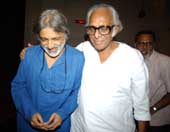 |
| Film-maker Mrinal Sen greets Anand Patwardhan at the screening of War and Peace in Calcutta. Picture by Pabitra Das |
This is the film that was slated to open the Calcutta Film Festival. It was given out that the film had not arrived on time. So, it was not screened at all. In actuality, Delhi wanted it blacked out. So, the audience did not get to see it at all at that time.
Thanks to Seagull, Anand Patwardhan’s hard-hitting documentary film, War and Peace, was screened at Max Mueller Bhavan on Monday evening. The hall was packed to capacity, and one realised why Delhi has all along been so anxious to suppress it. As is well-known by now, the censor board had tried to snip off significant sections of it — 21 in all — particularly the opening, showing the assassination of Gandhi by Nathuram Godse. The board also wanted all mention of the Tehelka arms scandal and all speeches by political leaders to be deleted. But in its final verdict, Bombay High Court said: “It is a matter of his legitimate right to decide as to what should be included therein and we have no hesitation in saying that neither of the two cuts recommended are in any way justified.”
So, what was the supposedly incendiary footage that the BJP government went out of its way to obliterate? Pramod Mahajan’s speech, for one, where, post-Pokhran, he exults in India’s new-found status as a member of the exclusive nuclear club, never mind that the mind-boggling and ever-increasing defence budget left little behind for crucial sectors such as education. The Dalit leader’s railing against the use of the phrase “Buddha smiling” as the code for the first nuclear blast was nothing short of fiery. What makes them potential rabble-rousers is that Patwardhan, who handles the camera himself, has caught them in the heat of the moment. The beaded perspiration and tension that such speeches produce in the audience is quite tangible.
Patwardhan pulls no punches, and the extensive coverage of the villages directly affected by the “peace” bomb — remote villages in Rajasthan, the sites of the blasts, and the Bihar hamlets, where uranium is mined — provide the more human face to his case against militarism, often confused with patriotism. The shots of the deformed children of uranium mine-workers are the strongest and most poignant indictment of belligerence.
Patwardhan spares nobody. He exposes the duplicity of political and religious leaders on both sides of the fence. However, his faith in the goodness of the human heart is unbounded. Nonetheless, while the war-like stance of both the Indian and Pakistani governments is certainly counter-productive, is Gandhian non-violence, that Patwardhan so strongly believes in, the answer? After all, Gandhi himself fell to the bullet of a terrorist. This, however, in no way undermines Patwardhan’s persuasiveness as an advocate of peace.










